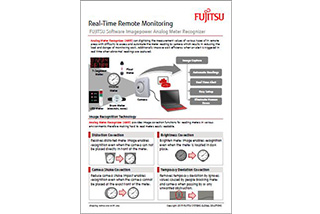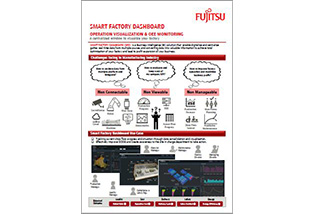Insights and trends

Fujitsu Smart Factory Insights & Trends
Fully Utilizing IoT Inside Large Plants, Connecting People, Machines and Processes
Siam City Cement (SCCC) chose Fujitsu to deliver IoT technologies to improve production efficiency:
(1) Digitally connected the whole plant
(2) Mobile devices are used for inspection patrols
(3) Integrated IT (information technologies) and OT (operational technologies)
(4) Created a system to manage vendors and information
(5) Established a remote operation center
Steps to Digitalize Your Factory to Improve Your Competitive Advantage
Many Thai organizations want to make the leap from traditional manufacturing to a smart factory. Doing so is essential in the evolving Thai economy. With younger members of the workforce demanding digital processes, and global competitors more than willing to also digitalize for improved competitiveness, Thai manufacturers can’t afford to delay the move to smart factories.
Putting Smart Factories to Work in Thailand
The journey to becoming a so-called ‘smart factory’ doesn’t have to occur all at once. Manufacturers can implement incremental changes depending on how mature the facility already is. Fujitsu is working with numerous manufacturers in Thailand and across Asia to help them transition into smart factories.
Smart Factory and DX in Manufacturing for Thailand ICT Decision-makers
A range of new technologies such as artificial intelligence, robotics, and 3D printing mean that smart factories can be built and operated at a much lower cost and at a much smaller scale than conventional manufacturing facilities. This report describes how Thai manufacturers are well advanced on their DX journey's.
Technologies to Improve Quality in Manufacturing Organisations
Improving quality can be a key competitive differentiator for manufacturers. While it can reduce costs and improve output, quality assurance can also ensure that the finished product receives positive customer reviews. Fujitsu technologies enable 100% of manufactured goods to be inspected rather than just a random sample; improving quality, lowering costs and saving time.
Leveraging the Internet of Things for Improved Manufacturing Performance
IoT applications are ideally suited to manufacturing because of the industry’s longstanding use of automation and robotics. IoT takes this to the next level with smart sensors that monitor automated processes and provide detailed information to plant managers. Download our free report to discover how Thai manufacturers are using Smart Factory technologies to secure their future.
Smart Factory Ready for Wider Adoption, Promising to Transform Manufacturing Business
The smart factory technologies, such as IoT sensors, data visualization, robotics, augmented reality and AI enable manufacturers to reduce equipment downtime, lower costs and optimize production. Many of these digital technologies are already making a difference in Thailand, where the Siam City Cement Public Co.(SCCC) launched a digitally connected plant in late 2017. Early results from the implementation promise a 2% improvement in annual overall equipment efficiency (OEE) and a decrease in maintenance costs by 10%.
As They Seek to Profit from Data, Manufacturers Must Deal with Heightened Security Risk
Competition in the digital era is requiring industrial companies to integrate valuable production data with corporate IT networks. But the task does not come easy. Connecting the production OT and corporate IT networks greatly increases a company’s cyber-security risks. At the same time, differences in the technologies and functions of the two types of networks has made responding to the security threats more challenging, in many ways, than safeguarding an IT network alone.










